This past summer, many classes were busy with gardens of their own. CDLS was awarded a pollinator grant through Monarch Joint Venture. The funds were used to establish three pollinator gardens at CDLS with the help of toddler and preschool classes. We also received a grant for four raised garden beds through the Minnesota State Horticultural Society’s Garden-in-a-Box program. This grant included the supplies needed to build four round garden beds including seeds and plant starts. The kitchen was able to use some of the herbs and tomatoes from class gardens in their recipes. The classes involved with gardening used their harvest for class cooking projects and family gatherings.
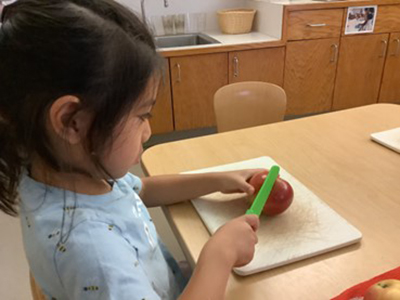
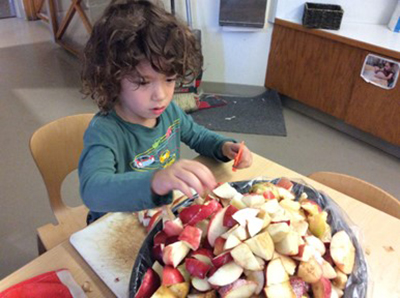
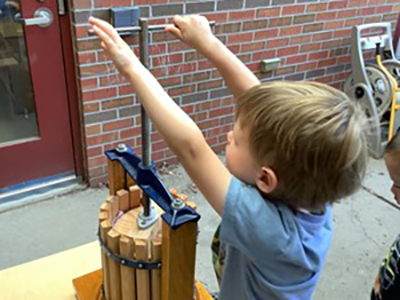
As the harvest season comes to an end, we are embracing the bounty before it is gone. In late summer, we made a connection with an orchard in the northeast metro, Bumblebee Orchard. A staff person has been driving up to acquire the orchard-fresh apples weekly to be included in our menu.
The abundance of apples were also used in several of our toddler and preschool classrooms. These classes used our school apple press to make their own fresh cider. Classes also used the apples to make fresh applesauce, yum! Children in the Dakota Language Nest, meanwhile, helped prepare winter squash and pumpkin, even scooping and roasting the seeds.
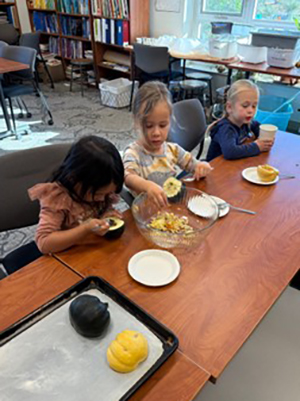
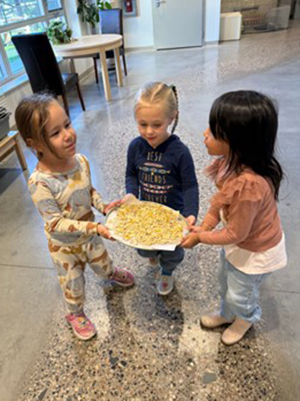
The kitchen has also been able to include fresh produce purchased from a small farm market near the orchard. Items included bell peppers, zucchini, purple cauliflower, cabbage, and several varieties of squash. We hope to build on these local connections moving forward.
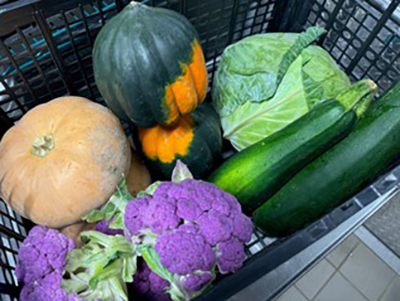
As we plan the monthly menu, staff review a list of seasonal items published by the Minnesota State Horticultural Society. Based on what is in season and class favorites, the menu is built. You will see seasonal items repeated often. By purchasing seasonal, local items, we are honoring the gifts of the earth while being fiscally responsible. When you look at the menu, you may notice those class favorites. The vegetables in a particular menu item may vary based on what is available seasonally. As fall transitions to winter and Mother Earth takes her rest, we will rely on what is most widely available to inform our menu. Items like beans, wild rice, potatoes, and squash will be seen frequently on the menu.
From Our Recipe Box
Curious about what it takes to feed an entire school? Here’s a popular recipe from our collection. (Read on for a scaled-down version!)
| Name: | Pumpkin Bread with Fresh Pumpkin |
| Recipe #: | 64 |
| Yield: | 140 |
| Serving Size: | 1 slice per child |
| Ingredients: | Weight/Measure: |
| Cooked pumpkin puree | 8 cups |
| Whole wheat flour | 5 cups |
| Whole grain flour | 10 cups |
| Sugar | 4 cups |
| Baking soda | 10 tsp |
| Cinnamon | 8 tsp |
| Nutmeg | 4 tsp |
| Ground cloves | 2 tsp |
| Ground ginger | 2 tsp |
| Butter or butter alternative | 4 cups |
| Eggs | 16 eggs |
| Procedure: | The evening before, set out butter to soften and bake pumpkin for 1 hour until soft. Blend the pumpkin meat and refrigerate overnight. Cream butter and sugar, add eggs and beat until smooth and fluffy add the pumpkin and stir until mixed. Add dry ingredients. Cook at 350 for 1 hour or until cooked through. |
Here’s the same recipe on a scale that might work better for your family!
| Name: | Pumpkin Bread with Fresh Pumpkin |
| Recipe #: | 64 |
| Yield: | 18 servings |
| Serving Size: | 1 slice per child |
| Ingredients: | Weight/Measure: |
| Cooked pumpkin puree | 1 cup |
| Whole wheat flour | 1 scant cup |
| Whole grain flour | 1 cup |
| Sugar | ½ cup |
| Baking soda | 1 1/4 tsp |
| Cinnamon | 1 tsp |
| Nutmeg | ½ tsp |
| Ground cloves | ¼ tsp |
| Ground ginger | 1/4 tsp |
| Butter or butter alternative | ½ c |
| Eggs | 2 eggs |
| Procedure: | The evening before, set out butter to soften and bake pumpkin for 1 hour until soft. Blend the pumpkin meat and refrigerate overnight. Cream butter and sugar, add eggs and beat until smooth and fluffy add the pumpkin and stir until mixed. Add dry ingredients. Cook at 350 for 1 hour or until cooked through. |


